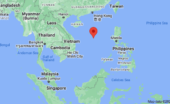Re Ian Bremmer 'Could third-party candidates upend the 2024 US election?' 3 April The current political movement in the USA…
Wednesday Night #1751
Written by Diana Thebaud Nicholson // September 23, 2015 // Wednesday Nights // Comments Off on Wednesday Night #1751
As Yom Kippur ends, the 2015 Hajj begins and the now-famous tent city at Mina (the one that is definitely NOT for refugees even though it is only used for one week a year) fills up.
The past week has been filled with news on so many different fronts that picking and choosing is almost impossible. However, before delving into the Wednesday grab bag, we are thrilled to share the news that Cleo Paskal has been named one of five 2015 Trudeau Fellows. You will also enjoy her recently published policy note (for CÉRIUM) Modi-fied Engagement: Will India’s Reinvigorated Foreign Policy Change History?
The refugee crisis continues. Although the EU’s interior ministers finally agreed on Tuesday to the principle of sharing 120,000 refugees between member states, The Guardian reports that there is much resentment among central European nations -notably Czech Republic, Slovakia, Hungary and Romania- “of what they perceive as western – and especially German – bullying. In the minutes after the decision, Slovakian and Czech politicians reacted with anger to a decision that they claim will alter the fabric of European society.” Inevitably, this is only a stop-gap measure, as the masses of refugees will continue to arrive and resentment will continue to grow unless there is a persistent campaign to educate the populations of the host countries along the lines presented by OECD Secretary-General Angel Gurría in his piece on Project Syndicate, We [Europe] Should Not Be Afraid.
The Conservatives moved to quell the storm that has been brewing over Minister Chris Alexander’s unfortunate reaction to the crisis. He has reversed his initial position (and somewhat improved his tone), announcing (Conservative government aims to resettle 10,000 Syrian refugees by September 2016) that Syrians and Iraqis fleeing civil war and sectarian conflict will no longer have to prove they are ‘convention refugees’, but will be presumed to be refugees for the purposes of vetting their applications. … He also said the government would deploy additional officers to missions abroad and that applications from Syrians and Iraqis will be handled within six months of being filed. While we applaud the moves, we cannot help but wonder how they will affect the lengthy wait times for processing of non-refugee applications. “Deploying additional officers abroad” presumably means there will be fewer to deal with cases already in the pipeline.
Meanwhile, the situation in Syria continues to deteriorate. New concerns center on Russia’s role. As UK defence secretary Michael Fallon stated somewhat simplistically, Russia’s military buildup in Syria has further complicated an already complex situation. However, The Economist is more sanguine: “It is important to both [Vladimir Putin’s] domestic and his foreign audience to be able to show two things. The first is that Russia opposes regime change and will defend its allies. Mr Assad may, eventually, be eased out as part of a deal in which Russia will be a key broker, but it wants to be able to make that deal, which could well be discussed in New York, from a position of strength, not weakness. The second is to signal that Russia is a vital partner for America in the fight against IS and jihadist terror in general, which Russia has even more reason than America to fear. Such a coalition underlines Russia’s continuing status as a great power, and helps bring it back in from the cold, ending the long stand-off between Russia and America over Ukraine.”
One of the more interesting analyses offered comes from George Petrolekas Why Russia is suddenly interested in Syria’s civil war, which includes this suggestion: “Often forgotten in the West is that the majority of Christians in Syria, the land of one of the oldest Patriarchates in Christendom (the Patriarchate of Antioch) – founded by Peter and Paul in 34 AD before Peter founded the Holy See in Rome – is resident in Damascus and has collegial relations with the Patriarchate of Moscow.”
An indication of the desperate situation in Syria is the fact that the Aleppo gene bank built to safeguard global food supplies is at risk. Consequently, at the request of researchers, the first withdrawal of seeds will be made from the Svalbard “doomsday” vault built in an Arctic mountainside to safeguard global food supplies – Syria war spurs opening of ‘doomsday’ Arctic seed vault.
The Svalbard vault was built principally in anticipation of the ravages of climate change and climate change is a major topic this week as Pope Francis will make an historic address to Congress — the first for any pontiff — on Thursday. He is expected to talk about global warming and its impacts on the world’s poor and developing nations. It should be fun to watch devout Catholic John Boehner squirm. On Friday, the Pope will speak to the UN General Assembly and it is anticipated that he will devote at least part of that address to sustainable development. His visit to the UN coincides with the opening day of the special summit at which the proposed sustainable development goals (SDGs) are expected to be adopted by UN member states. HuffPost is publishing a series “What’s Working: Sustainable Development Goals,” in conjunction with the United Nations’ Sustainable Development Goals (SDGs). Paul Shrivastava‘s thoughtful contribution Welcome to the World of Waste and Imbalance was published last week.
Were you surprised by the results of the Greek elections? Will they change anything? The Wall Street Journal suggests that Re-election win may reassure markets and European officials that Greece will stick to its bailout plan
The Canadian election campaign drags on with mini-crises, faux pas, slips of tongues creating a flutter and disappearing with the next day’s offerings. From whether or not to cancel the F35 to the ethics of the James Moore announcement that the Conservatives would match funds raised by the Terry Fox Run, pronouncements from all sides are coming thick and fast with little regard for, or discussion of, their relative importance. As Justin Trudeau promised increased funding for the arts, including an investment of $150 million in new annual funding for CBC/Radio-Canada, CBC announced at a town hall for staff that it is selling all its property across the country, including major production facilities in Montreal and Toronto. Maybe they should wait until after October 19? What is interesting is the apparent evolution of Justin Trudeau’s stance on the minority government scenario – an increasingly likely possibility according to current polls. It seems there could be a possibility of cooperation in some form with the NDP. Meanwhile, Elections Canada warns staff to watch out for ‘voter suppression’ tactics.
Having subjected ourselves to the Globe & Mail debate on the economy last week – in our opinion a dreadful waste of time – we are wondering if we can bear to watch any more. However, the Munk debate on Foreign Policy next Monday should avoid many of the errors of the G&M debacle and will provide the viewers with a cogent view of the policies proposed by each leader.
For the political junkies, Linda Renaud advises that The Montreal Press Club is hosting a discussion on Monday just before the debate – starting at 5pm – Canadian Election 2015: “Beyond the Rhetoric” with John Parisella and Philippe Gervais, introduced by Céline Cooper and moderated by L. Ian MacDonald.
In an article in the Globe & Mail, Don’t call it a scandal: Volkswagen corruption is a syndrome, Henry Mintzberg argues that “the Volkswagen affair is just a blatant case of an accelerating trend. Expect it to get worse, because we are living in a world where predatory capitalism is triumphing.
“In Europe, the United States, Japan and most everywhere else, something is going on. There is a level of sheer corruption that transcends the automobile industry.
“How about banking in the United States and Europe? How about politics, most everywhere? Now Brazil is receiving a lot of attention, while the utter corruption of U.S. politics – private money in public elections, a level of lobbying out of control – carries merrily along.” And turning his attention to the pharmaceutical industry: “University professors are in cahoots with pharmaceutical companies that think nothing of charging hundreds of thousands of dollars for life-and-death products that cost them hundreds of dollars to produce. And economists who cannot see past markets support such nonsense. Are they thinking at all? Some markets. This is the exploitation of monopolies called patents whose prices are not being regulated. And not just any old monopolies: People have to die for want of these, for the sake of obscene profiteering. What kind of a society tolerates this?”
Which bears directly on two recent stories about exorbitant increases in the price of drugs – part of a trend in the pharmaceutical industry of small companies buying up old, off-patent drugs and jacking up the price. The news of the 5,000 percent overnight increase in the price of Daraprim caused such outrage that CEO Martin Shkreli (a nasty piece of work according to media accounts) of Turing Pharmaceuticals has backed down, although he seems unchastened. The outcry over Daraprim has also caused Rodelis Therapeutics to reverse its decision to introduce a 2000% increase in the price of Cycloserine, a critical drug used to treat a rare and dangerous form of multidrug-resistant tuberculosis. Rodelis is returning the rights to Cycloserine to the non-profit Chao Center from which they were purchased in August.
At the risk of depressing you further, we cannot overlook David Jones’ latest column in The Metropolitain, New ‘Inconvenient Truths’
“Former U.S. Vice President Al Gore made a name for himself (and snarfed up a Nobel Prize) with his “Inconvenient Truths” film. The film, although in retrospect fundamentally and irredeemably flawed, professed to convince viewers that “global warming” (or “climate change”) was a near term peril that would inalterably damage the earth and its inhabitants (flora and fauna both) unless dramatic, near term action was taken.
“Essentially, viewers rejected the Apocalypse Today (or at latest tomorrow). They decided (correctly or not) that Gore was wrong, the data was skewered, the time lines were too long to worry about in a foreseeable lifetime, and/or there was nothing normal citizens or societies could do other than wreck their economies if they embraced the solutions. So, essentially, despite assorted international conferences postulating unobtainable goals, societies and governments have taken a “What? Me worry?” attitude.”
“That is the first of the new inconvenient truths: that nobody cares about global warming, global cooling, or global-just-the-same. The polar bears can drown (or not); the Maldives can disappear beneath the waves (or not); Bangladesh can flood to the Himalayas (or not); etc. Global warming has become just the latest ideological battle between those with time on their hands and nothing important (like grubbing a crop from hostile soil) to do.”
On a happier note, we salute all the Virgos and other Septemberists, as Kimon terms us, wishing you happy first days of Fall and a wonderful forthcoming year, during which you may enjoy the new BBC site featuring thousands of hours of shows that never reach the airwaves in the U.S., along with a sizeable back catalogue.



